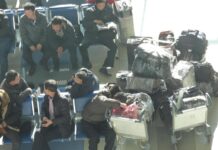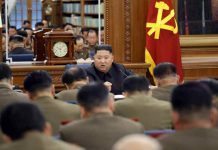North Korea continues to keep its borders closed despite the worldwide end of the COVID-19 pandemic.
The country’s civilian economy has taken a major hit from the closure of the borders given that most North Koreans live off buying or selling goods imported from China. Smugglers who deal with Chinese business people, those who sell Chinese imports in markets, and transportation workers who carry goods between China and North Korea have suffered crippling losses.
Daily NK recently conducted an interview with “Mr. A,” a North Korean truck driver who transported goods between Sinuiju and Dandong before the pandemic. He spoke of several things, including how he made a living during the COVID-19 pandemic and how things have changed recently.
Prior to the closure of North Korea’s borders in January 2020, Mr. A spent over 10 years driving a 40-ton Japanese-made cargo truck between Sinuiju and Dandong. The outside of his 30-year-old truck was rusted because it was so old, but the vehicle ran since the engine was still good.
After purchasing the truck on his own, he attached himself to a transport company, paying a set fee for privilege. Prior to the closure of the borders, orders from the company accounted for 60% to 70% of his cargo, while the rest he carried as part of his private business.
When times were good, he earned up to RMB 10,000 to 20,000 (around USD 1,400 to 2,800) a month, but after the closure of the borders, his income dried up. Nevertheless, because he made more than the average person, he was able to survive on the money he had saved up
The following is the full text of the Q&A with Mr. A.
Daily NK (DNK): Did you make no money at all while the borders have remained closed?
“All drivers are men, and they had no work after the border closure. Women made a bit of money through market commerce, but they couldn’t make enough money at the markets to survive on. I couldn’t just sit around and do nothing all day, so I pretended to do something. In fact, I survived off the money I’d saved while driving a truck for over 10 years. I also made a bit of money lending out my truck when trading companies occasionally asked for one.”
DNK: Interregional travel within North Korea has become easier these days, which has allowed cargo-related activities to make a comeback as well. In general, has cargo-related work increased?
“Cargo-related work has increased a bit compared to last year. I get five or so jobs at most a month. That’s just about enough to earn a living. You can’t make a lot of money lending your truck or transporting goods that enter Sinuiju to Pyongyang or other regions. I’ll only be able to do proper amounts of work when trade with China opens up. I can earn money when I take orders from trading companies and import items for my own private business. I can’t make money when things are like they are now.”
DNK: When strict COVID-19 protocols were in effect and people brought goods in from Dandong, they had to store the cargo at Uiju Airfield for quarantine purposes. What about now?
“As recently as last year, when goods entered Sinuiju, I sometimes transported them to Uiju Airfield. Nowadays, however, goods that enter Sinuiju go straight to Pyongyang. I haven’t seem them conduct separate quarantines in Sinuiju or Uiju. They’re not doing COVID quarantines like they did in the past. People aren’t even wearing masks in other countries, so I don’t know why we’re the only ones keeping our border locked up.”
DNK: Cargo truck service between Sinuiju and Dandong was expected to restart soon, but hasn’t yet. Have there been any orders or signs that cargo truck service will restart soon?
“Orders have continued to come down related to this issue. Early last month, the customs house said the bridge to Dandong was reopening, and in May, trade officials sat for lectures. They said they’d reopen the bridge several times but failed to deliver, so it’s hard to predict when it will reopen. Nevertheless, I think the national economy will survive only when cargo truck trade reopens. Trains can bring a lot of goods in, but they have fixed times. Trucks, however, can come and go whenever. I think the bridge will definitely reopen; it’s just a matter of time.”
Translated by David Black. Edited by Robert Lauler.
Daily NK works with a network of sources who live inside North Korea, China and elsewhere. Their identities remain anonymous due to security concerns. More information about Daily NK’s reporting partner network and information gathering activities can be found on our FAQ page here.
Please direct any comments or questions about this article to dailynkenglish@uni-media.net.



















